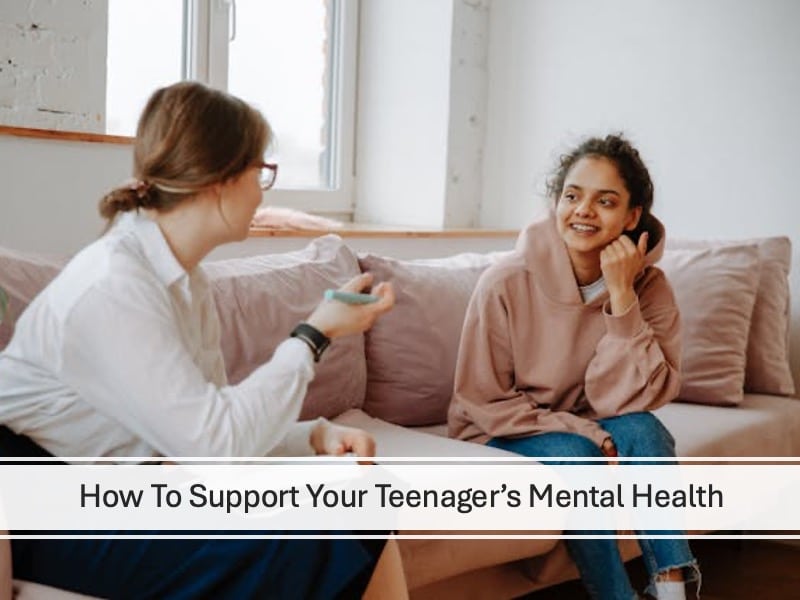How To Support Your Teenager’s Mental Health: Actionable Tips & Advice
If you’re the parent of a teenager, then you already know how tumultuous their emotional lives can be.
You might even remember how tough it could feel when you were that age.
However, the ups and downs of being a teenager shouldn’t always (or even ever) be set aside as just characteristic of that stage of life.
Stress, depression, and anxiety do start to manifest more frequently around this time, and can have impacts much longer-lasting than just a few mood swings.
As such, if you want to be the best parent you can, you should think seriously about their mental health and what you can do to support it.
Why Is It Important to Monitor Your Teen’s Mental Health?
Adolescence is a critical period of brain development, and emotional dysregulation during this stage can predict long-term mental health outcomes into adulthood.
Research shows that half of all lifetime mental health conditions begin before age 14, making early awareness and support essential for prevention and recovery (Kessler et al., 2005).
Unchecked stress, anxiety, or depression can negatively affect school performance, self-esteem, sleep patterns, and physical health, ultimately shaping long-term life trajectories.
When caregivers stay aware of mental health changes, they can intervene before struggles escalate into crises, self-harm behaviors, or substance misuse (Patel et al., 2018).
Monitoring also reduces stigma, demonstrating that mental well-being is as important as physical health and should be talked about openly.
Parents who stay engaged without judgment give teenagers a protective buffer that reduces the risk of lasting psychological harm.
Early recognition and support are proven predictors of better emotional resilience, healthier coping mechanisms, and long-term stability.
Common Mental Health Issues for Teenagers
Anxiety disorders are among the most prevalent mental health issues in teens, often presenting as excessive worry, panic attacks, or avoidance behaviors that interfere with school, sleep, and relationships (Beesdo et al., 2009).
Depression frequently emerges during adolescence and may appear as irritability, withdrawal, lack of motivation, or chronic fatigue rather than sadness alone, which often causes it to be overlooked by adults (Thapar et al., 2012).
Eating disorders such as anorexia, bulimia, and binge eating disorder are increasingly common and are strongly linked to body image pressures amplified by social media and peer comparison cycles (Nagata et al., 2020).
Self-harm and suicidal ideation must be taken seriously, as suicide is the second leading cause of death among teenagers in many countries, highlighting the need for early intervention and open communication (CDC, 2025).
Attention-deficit/hyperactivity disorder (ADHD) may continue or emerge during adolescence, affecting focus, academic performance, and emotional regulation when unmanaged (Faraone et al., 2021).
Substance misuse often coexists with mental health struggles and may be used as a coping mechanism, increasing the risk of long-term dependency and worsening psychological distress (National Institute on Drug Abuse).
How to Help Your Teenager’s Mental Health

Supporting a teenager’s mental health requires patience, awareness, and a willingness to meet them where they are emotionally and developmentally.
The most effective strategies blend compassion with structure, helping teens feel safe expressing their feelings while also guiding them toward healthy habits and coping skills.
Simple daily actions such as active listening, encouraging balance in school and social life, and modeling emotional regulation can create a powerful protective foundation.
Parents who understand the psychological realities of adolescence are better equipped to respond to warning signs early, promote resilience, and ensure their child does not feel alone in their struggles (Qian, 2024).
Maintain Open Communication
One of the ways to make it a little easier to have those talks about mental health is to maintain open communication at all times.
If you can help them feel like it’s safe to talk, whenever they want, about the things on their mind, they’re a lot more likely to open up to you.
Rather than making it a big “sit-down” conversation, regularly checking in, whether during car rides, walks, or meals, can allow that sense of connection to grow.
It’s essential to focus on listening during these talks, rather than lecturing or offering advice (unless specifically asked).
If your teenager doesn’t feel judged or dismissed in daily life, it makes it easier for them to share more difficult feelings, too.
Be Open About Mental Health
Even if your teenager is open with you about a lot of things, there is still a stigma around mental health that might make them reluctant to open up about how they’re doing.
Being a mental health advocate in your daily life can help chip away at these walls.
Showing emotional honesty (without oversharing) can help you demonstrate that stress, sadness, and anxiety are parts of normal life, and that knowing when to seek help is a strength rather than a weakness.
Discussing self-care techniques, developing resilience, and coping mechanisms for tough emotions can help individuals build the tools to manage their own mental health to some degree as well.
The Importance Of Validation
There is an unfortunate tendency among adults, including parents, to minimize their children’s feelings and struggles without truly considering them.
Often, it comes from a place of wanting to smooth things over or genuinely feeling like they have nothing to be stressed over, but it’s almost never helpful from their perspective.
Even if their feelings do seem dramatic or illogical to you, they are real to them, and acknowledging them without criticism can be important.
You don’t have to agree with their perspective to validate their feelings, but you do have to acknowledge and respect their experience.
If they feel safe expressing those emotions to you, then they’re more likely to share rather than bottle them up in the future.
Navigating The Risks Of Social Media
Although it might be the most “boomer” approach to take with your teenagers, the potential emotional health dangers of social media do need to be addressed.
Although it can be an excellent place to find community, connection, and to explore their passions, it has also opened up the gate to endless misinformation, comparison anxiety, cyberbullying and harassment, and generally developing unrealistic expectations.
Having conversations with your teenagers about their online health habits, not only how to protect their own personal information but also how to filter and better understand the content they encounter online, can make them less vulnerable to the toxic thought patterns that social media often promotes.
Encourage digital balance by helping them set boundaries, such as establishing screen-free time or encouraging them to discuss content that makes them feel uncomfortable or anxious with you.
Help Them Get Help
When your teenager is starting to really struggle, it can be important to gently guide them towards the options available.
Many hesitate to ask for help initially, but letting them know that services like Emora Health are available, normal, and widely used can make them more likely to explore them when the time comes.
You can discuss their worries and concerns, such as the fear of being judged or uncertainty about the process, and offer to help, whether by finding the services that best suit them or by taking care of the logistics for them.
It’s also important to remind them that mental health services are confidential and, most importantly, designed to help them.
You can help teenagers understand that they’re not a consequence of doing something wrong, but a way to help them feel and do better in life.
Promote Acts Of Kindness
Isolation and nihilistic inclinations can make struggles like depression and anxiety more prevalent in teenagers.
By helping them connect to the community around them and by enabling them to make a positive impact in the lives of others, it can significantly improve their mental well-being as well.
This can include helping them find volunteering efforts to join (or even joining them together), participating in community projects, or even modeling behavior by helping neighbors and those in need yourself.
Giving back improves empathy and feelings of purpose, and can also help connect them to positive role models beyond yourself.
Encourage A Healthy Lifestyle
Mental health and physical health are very much linked, especially for teenagers whose hormones can dominate their moods.
Ensure that you encourage all of the healthy habits that directly influence their energy levels, stress, and mood, such as regular sleep, nutritious meals, and regular physical activity.
If they’re not getting out or moving enough, finding activities they enjoy, be it sports, team-based fitness activities for kids, hiking, or something more creative, can be important.
However, it’s also crucial to recognize that teenagers require significantly more sleep and recreation to support their rapidly growing bodies. Model a healthy lifestyle, yourself, so it’s easier to emulate or join in with you.
Final Thoughts: Supporting Your Teenagers Mental Health
Supporting your teenager’s mental health requires consistency, empathy, and a willingness to listen even when conversations feel difficult.
The strategies above highlight how emotional validation, healthy boundaries around technology, and access to appropriate mental health resources create a foundation of safety and resilience.
Model balanced habits is one of the most effective health and fitness tips for children, including sleep hygiene, healthy eating, adequate physical activity, and stress management, which help reinforce that mental and physical well-being are deeply connected.
Even when progress is slow or communication feels strained, showing up with patience and genuine concern communicates that your teenager is not facing their struggles alone.
Small daily actions, such as checking in during car rides, eating meals together, or encouraging movement and outdoor time, can have a profound long-term impact on their emotional stability and sense of belonging.
The goal is not perfection but presence.
When teens know their home is a safe place to express feelings without judgment, they are more likely to seek help when they truly need it.
This website does not provide medical advice. This website site does contain affiliate links, and purchases may earn a commission.
Read my Medical Disclaimer, Review Disclaimer, and Publishing Policies for more details. Use of this site indicates acceptance of these terms.



